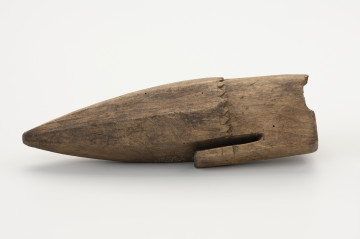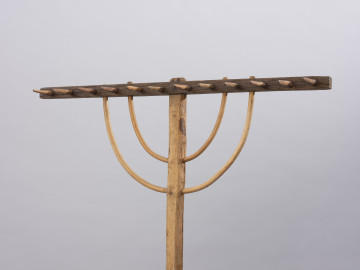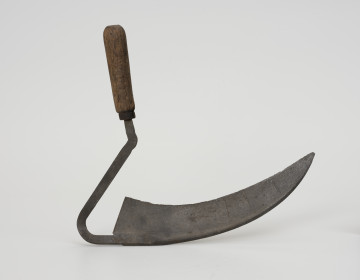
Whetstone holder
1925 — 1935
National Museum in Szczecin
Part of the collection: Material culture of West Pomerania
„And from the village, you can hear singing,/ The boys are hurrying, the girls are hurrying,/ They are carrying the rake, they are going into the field,/ They are tying the sheaves behind the harvesters./ Dana! Da-dana!” (Maria Konopnicka Żniwa). The rakes, referred to in the poem by the Polish author quoted above are one of the most basic tools found on every farm. There were many types of rakes that differed slightly, mainly in the number of tines and the way they are constructed. In comparison to other, more complicated tools, making rakes was a relatively simple task. It did not require any specialised knowledge, workshop, tools, resources, or high precision. This is why they were often home-made, for individual use. First and foremost, the light wooden rakes were used at haymaking for raking the cut grass. During harvesting, they were also employed to raking the ears remaining in the field after the grain has been stacked in the sheaves. Nowadays, rakes are still common in the field and garden works. They are now made from different materials and wood is still one of them. In traditional agricultural traditions of Western Pomerania, one could find rakes with the engraved date of making and a pattern indicating their ownership. In the collection of the Department of Ethnography of Pomerania of the National Museum in Szczecin, there are five-tines wooden rakes made in 1874, decorated with a design of a heart, cross and a floral and geometric ornament.
Agnieszka Słowińska
Author / creator
Dimensions
cały obiekt: height: 171 cm, width: 51 cm
Object type
agricultural equipment
Creation time / dating
Creation / finding place
Identification number
Location / status

1925 — 1935
National Museum in Szczecin

1960 — 1965
National Museum in Szczecin

1880 — 1910
National Museum in Szczecin
DISCOVER this TOPIC
Castle Museum in Łańcut
DISCOVER this PATH
Educational path